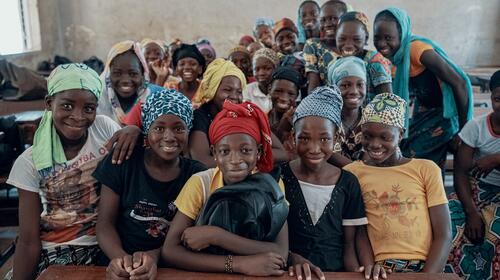Updates
With new World Bank funding, SWEDD 2 to expand to Cameroon, Republic of Guinea
04 Jun 2020DAKAR, Senegal – UNFPA and the West African Health Organization will continue to provide technical support to programmes to advance women’s empowerment and strengthen legal frameworks that promote women’s rights to health and education in Africa's Sahel region after the World Bank approved $376 million in new funds for Phase II of the Sahel Women Empowerment and Demographic Dividend (SWEDD) project.
SWEDD 2 will scale up activities currently underway in Chad, Côte d’Ivoire, Mali and Mauritania and expand into Cameroon and the Republic of Guinea.
“The authorization of SWEDD 2 is a game-changer in our efforts to empower women and improve the lives of girls and women in the Sahel. It will certainly accelerate a demographic transition, and fast-track transformative shift in the region. Our gratitude to The World Bank for the support to scale-up this project as we strive towards more successful interventions,” said Mabingue Ngom, UNFPA Regional Director for West and Central Africa.
Phase II of the project will continue to support activities that target adolescent girls and their surrounding communities to improve life skills and sexual and reproductive health knowledge among adolescents; keep girls in school, expand economic opportunity; and create an enabling environment for girls’ social and economic empowerment through the nexus of statutory, religious and customary laws and norms, including through the prevention and improved response to gender-based violence. It will also enhance last-mile delivery of essential medicines, including access to contraceptives at the community level, and strengthen the capacity for midwives to deliver services in rural areas to women and adolescent girls.
SWEDD 2 will pay more attention to strengthening legal frameworks that promote women's rights to health and education through reinforcing legislation, boosting judicial capacity, and promoting knowledge and application of existing legislation in communities where harmful practices – such as child marriage or female genital mutilation – are highly prevalent.
Phase I (2015-2019) of the project intervened in areas and territories struggling to deal with child marriage, adolescent pregnancies and girls' school dropouts. SWEDD 1 made significant progress on girls' education, adolescent fertility, family planning, maternal and child health, the child dependency ratio and raising of the age of marriage.
Religious and traditional leaders promote community dialogue in support of girls' secondary education, women's social and economic empowerment, birth spacing; and against child marriage, early pregnancy and female genital mutilation. Boys and men are engaged through community-based interventions for women's empowerment. The project contributes to eliminating systemic bottlenecks in health service delivery and developing a policy agenda that places demography and gender at the centre of growth.
The regional initiative encourages country ownership of development programmes, emphasizes “faire-faire” and relies on national expertise to figure out the best way to effectively implement each programme.
UNFPA has been providing joint technical support with the West African Health Organization to SWEDD since 2015. In Phase II, the African Union will join the project as a new strategic partner.
